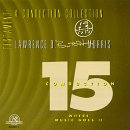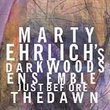| All Artists: Lawrence Morris Title: Conduction 15 Members Wishing: 3 Total Copies: 0 Label: New World Records Release Date: 5/7/1996 Genres: Jazz, Pop Style: Avant Garde & Free Jazz Number of Discs: 1 SwapaCD Credits: 1 UPC: 093228048022 |
Search - Lawrence Morris :: Conduction 15
 | Lawrence Morris Conduction 15 Genres: Jazz, Pop
|
Larger Image |
CD DetailsSimilar CDs |
CD ReviewsSounding like no one else. greg taylor | Portland, Oregon United States | 09/04/2004 (5 out of 5 stars) "First, my thanks to demomo for mentioning in his review that Arthur Blythe was featured on this CD. That led me to purchase this particular conduction to add to my collection. I am glad I did. The 10 CDs that have been released under the overall title "Testament: A Conduction Collection" present one of the most extraordinary bodies of work in contemporary music. They can be purchased singly or as a box set. This particular one is a live recording of Conduction 15 which occurred on November 15th and 16th, 1989. This was the first time that Morris was able to handpick his group and prepare them for about a week prior to the recording. More on the need for so much rehearsal time in a moment. First the musicians. As Demomo mentions, Arthur Blythe (may his tone be blessed forever!) is the main solo voice on alto sax, with Thurman Baker on vibraphone and percussion, Marion Brandis on flutes and piccolo, Vincent Chaney on french horn, Curtis Clark on piano, J.A. Deane on trombone, electronics and live sampling, Janet Grice on bassoon, Bill Horvitz on electric guitar, Jason Hwang on violin, Taylor McLean on percussion and glockespiel, Jemeel (fortheloveofgod)Moondoc on flute, Zeena Parkins on harp, and Brandon Ross of acoustic and octave guitar. Lawrence "Butch" Morris conducts. So what is conduction? What follows is a stab at a definition but if you are interested go to Morris' web site about it and the New World Records web site for more info. Conduction seems to have developed out of Morris' work with David Murray's Big Bands in the 80s and with various classically trained ensembles. The idea is to merge the acts of interpreting and improvising all under the guidance of the conductor. The conductor uses a series of some 18 hand signals that tell individuals, or sections or the entire orchestras to go in certain directions with the music. Morris might use a signal that indicates that everyone should make a sound like the one that is being made by a particular player. How they interpret that is up to the individuals within the group. But then Morris will give further gestural commands that take the results in certain directions and so on. The result is a constant give and take between the group and Morris. This can be done from a more or less traditional score (Morris mentions that Misha Mengleberg wrote a piece for him to use this way-it would be nice to have a recording of that!) or it can be used to create a composition on the spur of the moment. When the right people are working with Morris the results are truely unique. This particular grouping is superb. J.A. Deane is one of the most imaginative users of electronics and sampling that I know of. He contributes mightly to this piece. As does Arthur Blythe. The recording sounds as if he were miked from a distance but his playing shines thru none the less. I do not know if this particular conduction is from a score or not (for some reason I think not) but Blythe's playing acts as a thematic motif that ties it together. The result is spacious, atomospheric, passionate (have you ever heard Blythe play otherwise?) and quite lovely. For me this may be the most accesible of the conductions. I say may because I only know six of the others that are available. Morris' work is some of the most creative and important going on in music right now. It continues to be influential in not only jazz and classical circles but in non-western musics as well because it basic technique is applicable to any music style. Check some of his CDs out. If you don't like them, work on your karma and give them to friends to listen to. The music gods will smile on you." Great Music demomo | 08/17/2004 (5 out of 5 stars) "If you've ever wished free-ensemble music could have a little more substance to it, this whole series is something you've been looking for. This one features Arthur Blythe."
|

 Track Listings (3) - Disc #1
Track Listings (3) - Disc #1
